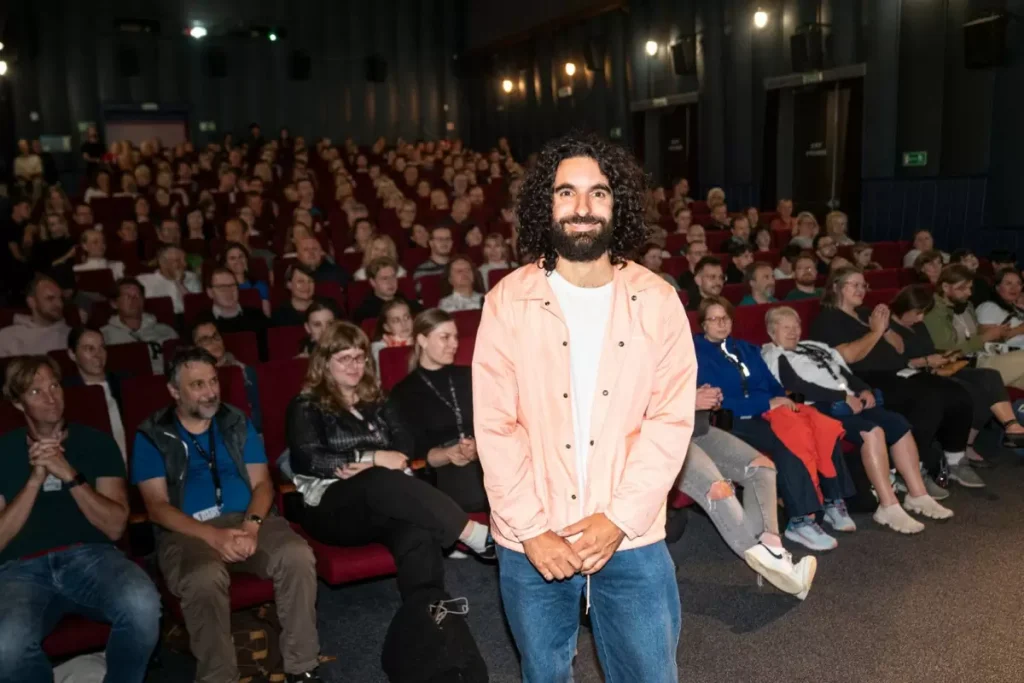A Second Life, Laurent Slama’s new film—shown at Karlovy Vary—delivered some of the festival’s most heartfelt moments, all without leaning on cheap sentimentality or chasing mass appeal. Slama, a director who previously made two films under the pseudonym Elisabeth Vogler (a name borrowed from Bergman’s Persona), has crafted a small, luminous work that radiates quiet joy. “I think much of the happiness you feel in the film comes from Elijah, played by Alex Lawther,” Slama told C7nema. “He’s a wonderful person. He arrived on set straight after working on a series [Alien: Earth], having spent six months in Thailand. He was just so happy to be filming in Paris, right in the middle of the crowds. I met him two or three days before shooting began, and when he opened the door, his hair was bright pink. It was perfect—it was exactly the colour of the film. He has played such intense, tightly wound characters, like in The End of the F*ing World. This time, he got a role that feels much closer to who he really is.”
Alex Lawther and Agathe Rousselle

A Second Life follows Elisabet, a woman in constant motion, darting from one short-term rental to another, delivering keys to guests across Paris. An American living in the city, she struggles with hearing loss and is under relentless pressure from her gig-economy employer—an Airbnb-style company—to maintain high guest ratings and solve any problems that arise during stays. With her visa about to expire and her job on the line, her life is a race against time—until Elijah appears. Calm, open, and disarmingly present, he doesn’t just slow her down; he helps her rediscover herself, and begin to live more gently. Joined by two other friends, they turn Elisabeth’s ordinary day into something quietly extraordinary.
Part urban fable, part documentary-like snapshot of a city transformed by a global event, A Second Life stars Agathe Rousselle—renowned for her explosive performance in Titane—as Elisabeth, a character deeply intertwined with Slama’s own life. “I used the pseudonym Elisabeth Vogler for my first two films,” he explains. “I didn’t want to keep using it as a director, so I decided to give the first name to the character. The film is very personal, and calling her Elisabeth was a way of placing myself in the story. It was obvious to me that I wanted to make a film with Agathe Rousselle—I wrote it for her. I wanted to make something like an American indie film, but through a French lens, about someone living in Paris. Agathe worked deeply on the emotional core of the role. I’ve always wanted to work with her—she’s incredibly physical, very expressive. Here, though, the character is much more restrained than in Titane, where she was absolutely brilliant.”
Whats Ahead
Already deep into his next project, Slama is shifting direction. “I’m working on a hostage thriller,” he says. “It’s about a very wealthy man who gets kidnapped on the streets of Paris. He’s fitted with an explosive belt so he can’t run. I want to make something politically charged about the present moment—the gap between the ultra-rich and the poor. A film about symbolic violence.”
This marks a departure from the guerrilla-style filmmaking that defines his earlier work—shooting on the fly, in real locations, often with crowds as part of the fabric of the story. “The demands of a thriller will change how I work,” he admits. “I want to seriously explore tension, to make a real thriller. That means needing a bigger budget, and I want to experiment with production. There’s a film I really loved—Souleymane’s Story—that inspires me with its modular approach. They shot most of it with just three people, fully embracing the rhythm of the streets. That kind of freedom still speaks to me.”


